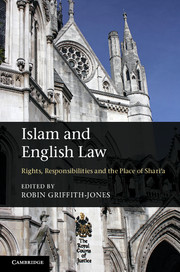Book contents
- Frontmatter
- Contents
- List of contributors
- List of abbreviations
- Preface
- Introduction
- Part I The Archbishop of Canterbury and shariʽa law
- Part II The Archbishop’s proposal for ‘transformative accommodation’
- Part III Responsibilities and rights
- Part IV Prospect: equality before God and before the law
- Select bibliography
- Index of cases
- Index
Part I - The Archbishop of Canterbury and shariʽa law
Published online by Cambridge University Press: 05 April 2013
- Frontmatter
- Contents
- List of contributors
- List of abbreviations
- Preface
- Introduction
- Part I The Archbishop of Canterbury and shariʽa law
- Part II The Archbishop’s proposal for ‘transformative accommodation’
- Part III Responsibilities and rights
- Part IV Prospect: equality before God and before the law
- Select bibliography
- Index of cases
- Index
Summary
The Archbishop of Canterbury and shariʽa law
It might be possible to think in terms of what [the legal theorist Ayelet Shachar] calls ‘transformative accommodation’: a scheme in which individuals retain the liberty to choose the jurisdiction under which they will seek to resolve certain carefully specified matters, so that ‘power-holders are forced to compete for the loyalty of their shared constituents.’ … It is uncomfortably true that this introduces into our thinking about law what some would see as a ‘market’ element, a competition for loyalty as Shachar admits. But if what we want socially is a pattern of relations in which a plurality of diverse and overlapping affiliations work for a common good, and in which groups of serious and profound conviction are not systematically faced with the stark alternatives of cultural loyalty or state loyalty, it seems unavoidable.
– From the Archbishop of Canterbury’s Lecture, ‘Civil and religious law in England’, in the Royal Courts of Justice, 7 February 2008.Question to the Archbishop: Must we accommodate Islam or not, as Christians?
Archbishop: Must we accommodate Islam or not as Christians? Must I love my Muslim neighbour? Yes, without qualification or hesitation. Must I pretend to my Muslim neighbour that I do not believe my own faith? No, without hesitation or qualification. Must I as a citizen in a plural society work for ways of living constructively, rather than tensely or suspiciously with my Muslim neighbour? Yes, without qualification or hesitation.
– From the Questions and Answers following the Archbishop’s Lecture, ‘Civil and religious law in England’, 7 February 2008.- Type
- Chapter
- Information
- Islam and English LawRights, Responsibilities and the Place of Shari'a, pp. 7 - 8Publisher: Cambridge University PressPrint publication year: 2013

